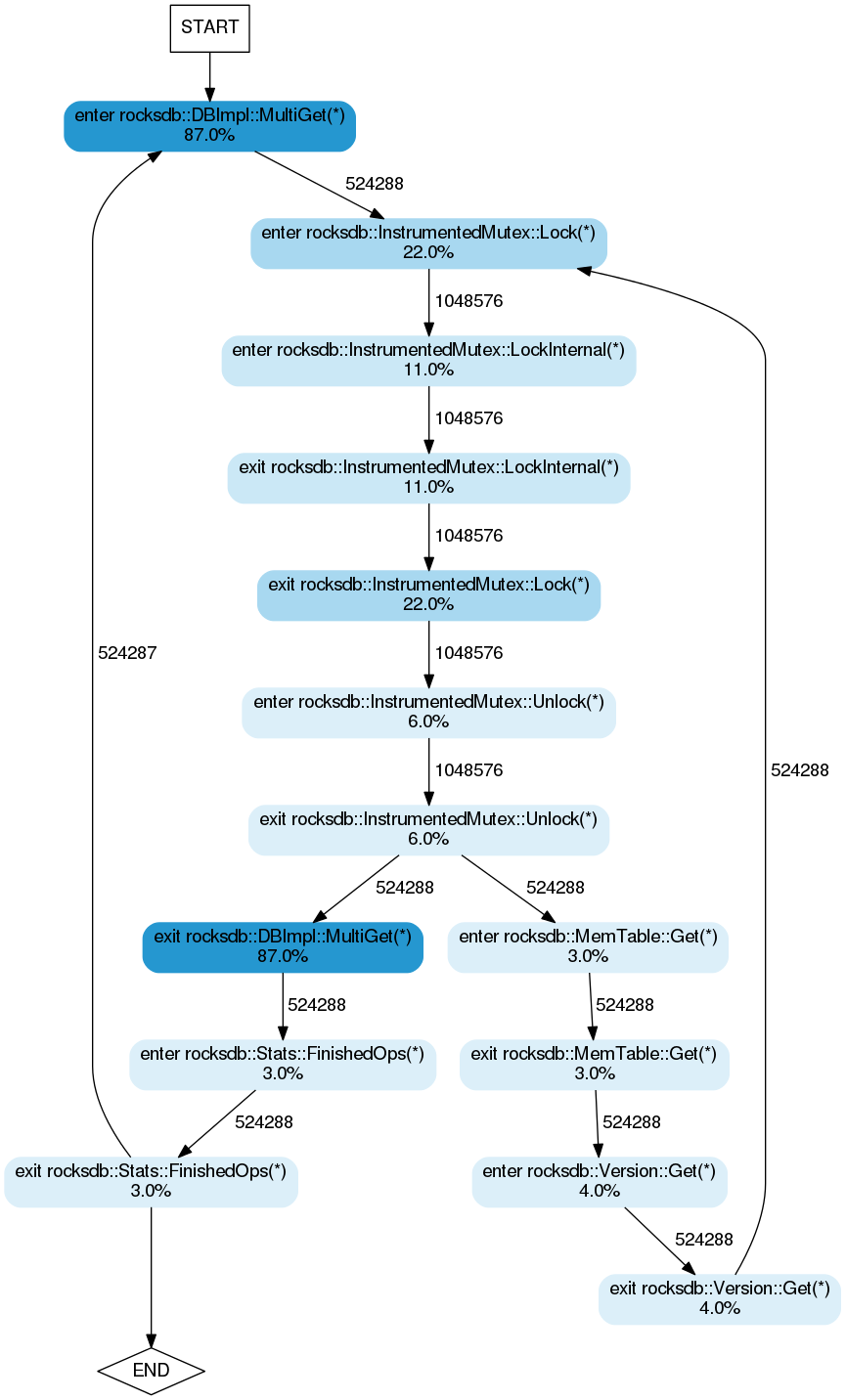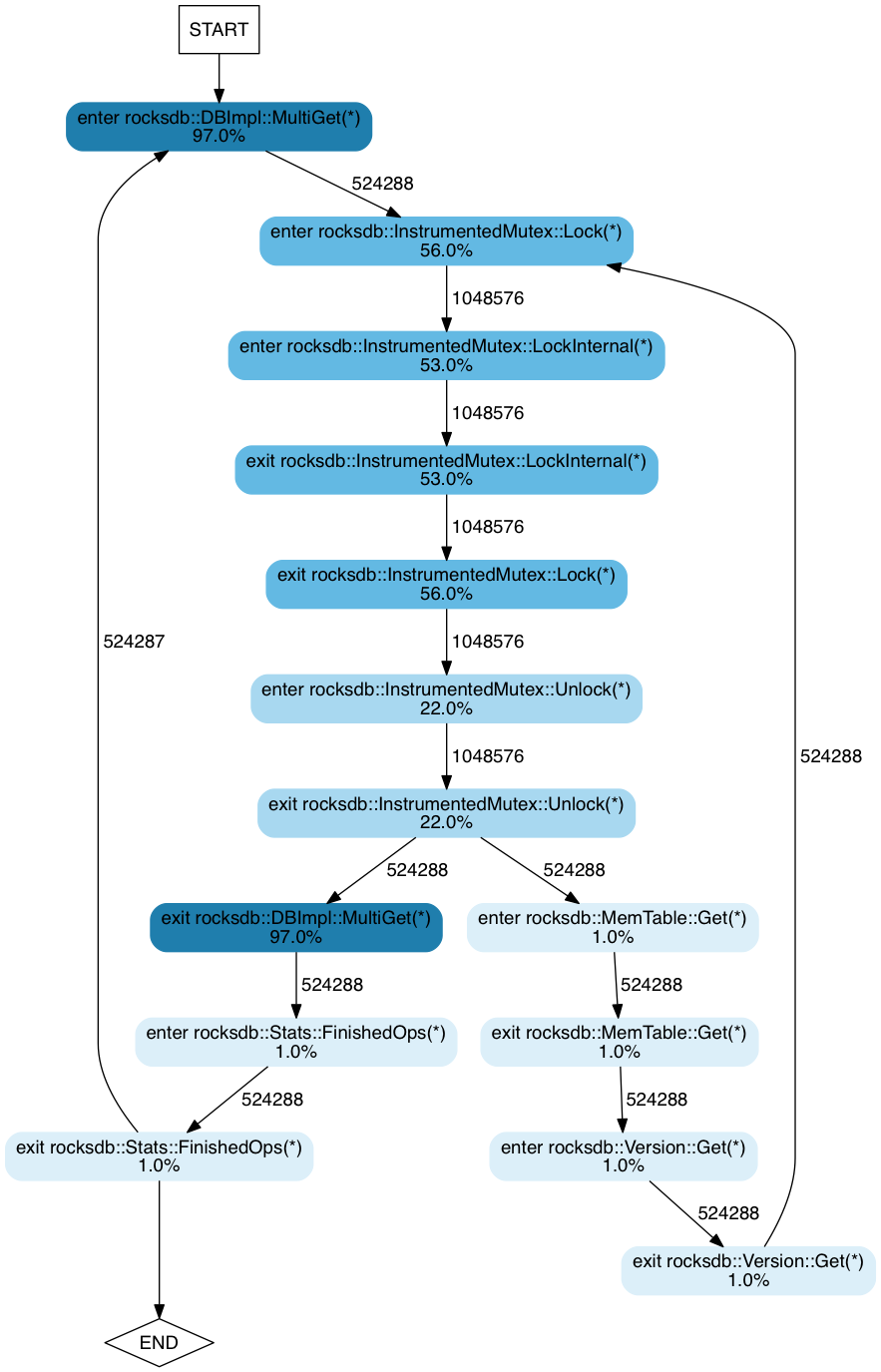Discovering lock contention in Facebook's RocksDB
03 Feb 2017This post describes how we discovered a source of scaling problems for the multireadrandom benchmark in RocksDB.
A while ago, we ran some scaling tests on a set of RocksDB benchmarks. We noticed that some of the benchmarks didn’t scale well as we increased the number of threads. We decided to instrument the runs and use FlowViz to visualize what is going on with multithreaded performance. The discovery helped open two issues in RocksDB’s repository: 1809 and 1811.
Here’s what we did:
(This tutorial was tested on DINAMITE’s docker container. To set it up, follow our Quick start guide. If any of the instructions do not work in your environment, please contact us.)
Setting up RocksDB
Configuring RocksDB to use DINAMITE’s compiler is straightforward.
The following is a set of environment variables that need to be set in order to
do this. Save it into a file, adjust the paths to point to your DINAMITE
installation path, and source before running ./configure
############################################################
## source this file before building RocksDB with DINAMITE ##
############################################################
export DIN_FILTERS=/dinamite_workspace/rocksdb/rocksdb_filters.json
export DINAMITE_TRACE_PREFIX=<path_to_trace_output_dir>
export DIN_MAPS=<path_to_json_maps_output_dir>
export EXTRA_CFLAGS="-O0 -g -v -Xclang -load -Xclang
${LLVM_SOURCE}/Release+Asserts/lib/AccessInstrument.so"
export EXTRA_CXXFLAGS=$EXTRA_CFLAGS
export EXTRA_LDFLAGS="-L${INST_LIB} -linstrumentation"
Make sure that $LLVM_SOURCE points to the root of your LLVM build, and that
$INST_LIB points to the library/ subdirectory of DINAMITE compiler’s root.
The contents of rocksdb_filters.json are as follows:
{
"blacklist" : {
"function_filters" : [
"*atomic*",
"*SpinMutex*"
],
"file_filters" : [ ]
},
"whitelist": {
"file_filters" : [ ],
"function_filters" : {
"*" : {
"events" : [ "function" ]
},
"*SpinMutex*" : {
"events" : [ "function" ]
},
"*InstrumentedMutex*" : {
"events" : [ "function" ]
}
}
}
}
Run ./configure in RocksDB root, and then run make release.
After the build is done, you should have a db_bench executable in RocksDB
root.
Running the instrumented benchmark
The following is the script we used to obtain our results:
#!/bin/bash
BENCH=$1
THREADS=$2
./db_bench --db=<path_to_your_db_storage> --num_levels=6 --key_size=20 --prefix_size=20 --keys_per_prefix=0 --value_size=100 --cache_size=17179869184 --cache_numshardbits=6 --compression_type=none --compression_ratio=1 --min_level_to_compress=-1 --disable_seek_compaction=1 --hard_rate_limit=2 --write_buffer_size=134217728 --max_write_buffer_number=2 --level0_file_num_compaction_trigger=8 --target_file_size_base=134217728 --max_bytes_for_level_base=1073741824 --disable_wal=0 --wal_dir=/tmpfs/rocksdb/wal --sync=0 --disable_data_sync=1 --verify_checksum=1 --delete_obsolete_files_period_micros=314572800 --max_background_compactions=4 --max_background_flushes=0 --level0_slowdown_writes_trigger=16 --level0_stop_writes_trigger=24 --statistics=0 --stats_per_interval=0 --stats_interval=1048576 --histogram=0 --use_plain_table=1 --open_files=-1 --mmap_read=1 --mmap_write=0 --memtablerep=prefix_hash --bloom_bits=10 --bloom_locality=1 --benchmarks=${BENCH} --use_existing_db=1 --num=524880 --threads=${THREADS}
Make sure you fix the --db argument to point to where your database will be
stored. In our case, the first argument ($BENCH) was set to multireadrandom
and the number of threads varied from 1 to 8 in powers of 2.
Results
The output logs were processed and visualized with FlowViz. The guide on how to use this tool is available here and will be omitted from this post for brevity.
Here is the FlowViz output for runs with 1 and 8 threads:
1 thread:

8 threads:

From these, it is immediately obvious that the amount of time spent performing locking operations increases with the number of threads.
These results were used to infer inefficiencies in workloads using MultiGet()
and led to opening of the two aforementioned issues on the RocksDB tracker.